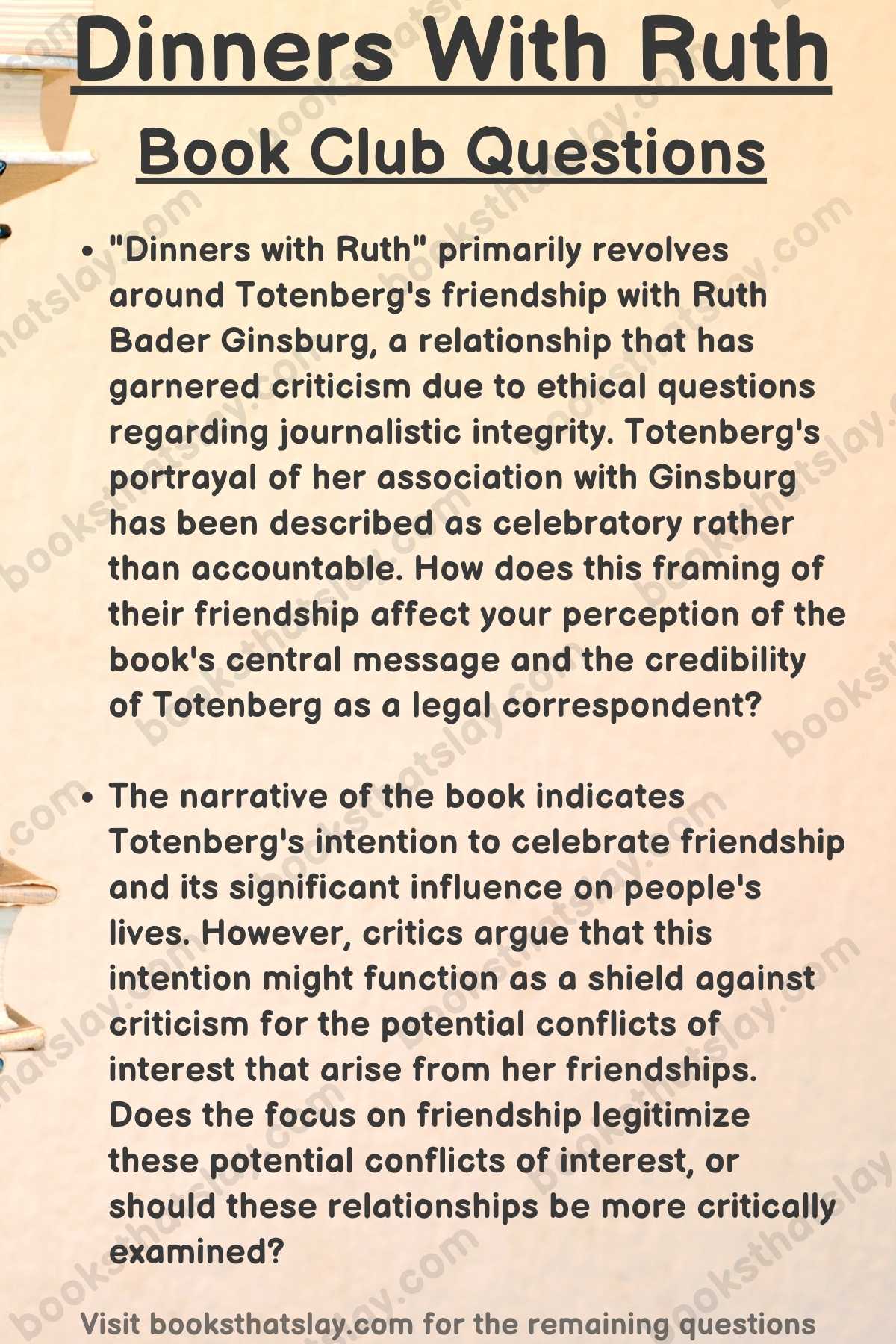15 Dinners With Ruth Book Club Questions For Discussion
Nina Totenberg’s memoir – it’s a tell-all about her life as a famous reporter, her struggles, and her amazing friendship with Supreme Court Justice Ruth Bader Ginsburg.
In this discussion guide, we will have a look at some amazing book club questions for Dinners With Ruth that will not just help you understand how to face difficult challenges with calm and poise but also teach you how to find and maintain lifelong friends along the way.
Let’s go.

Dinners With Ruth Book Club Questions
- The book outlines how both Totenberg and Ginsburg had to confront sexism in their respective fields during their early careers. How might the strategies they employed, such as determination and reliance on female networks, differ from how women approach similar challenges today? Has our society made sufficient progress, or are there still parallels and common ground between Totenberg and Ginsburg’s time and the experiences of women in the 21st century?
- Totenberg emphasizes that she and Ginsburg intentionally kept their work and personal lives separate. Do you believe maintaining strict boundaries between professional and personal relationships is important and feasible, especially in fields like journalism and law where high stakes decisions or cases are involved? Considering their unique roles, why might Totenberg and Ginsburg have found this separation more crucial than others?
- The book underscores how Totenberg and Ginsburg’s friendship was a source of strength during personal and professional trials. Consider the moments Totenberg describes, such as her first husband’s illness or Ginsburg’s husband’s death. How does their bond reflect the importance of support systems? Can you relate to the idea that friendships serve as a vital space for processing both grief and celebration?
- Totenberg describes her friendships with people who had drastically different political beliefs, like Justice Scalia or Ted Olson. How did she and those individuals navigate their differences while maintaining respect and affection? In today’s highly polarized society, what can we learn from the way Totenberg and her friends seemed to value the individual over the ideology?
- Totenberg expresses dismay at the current state of the Supreme Court, seeing it as more partisan than during her friend’s tenure. Ginsburg is remembered for her ability to collaborate with colleagues of opposing ideologies. In light of the book’s final chapters, how do you envision the long-term impact of Ginsburg’s legacy on the court, especially regarding issues of women’s rights and judicial approach?
- Throughout the book, Totenberg grapples with her role as a journalist friend of a Supreme Court Justice. What ethical considerations should journalists navigate when covering people they have close relationships with? How might Totenberg’s personal connection to Ginsburg have both enhanced and potentially complicated her reporting on the Supreme Court?
- Totenberg explores the concept of Ginsburg becoming a cultural icon and role model, especially later in life. How does Ginsburg’s reaction to fame – embracing it while remaining a somewhat private person – offer insights into the complexities of notoriety and public recognition? As her fame grew, did it alter Ginsburg and Totenberg’s friendship in any perceptible way?
- Ginsburg is known as a pioneer for women’s rights and her legal battles against gender discrimination. How does Totenberg’s book help illuminate the specific challenges Ginsburg faced as a woman lawyer and judge earlier in her career? Considering the book’s more recent publication date (2022), what victories and remaining hurdles for women’s equality might readers reflect on today?
- Both Totenberg and Ginsburg dealt with significant illnesses in their personal lives and careers. How did these health challenges shape their outlook on work, friendship, and life itself? Was there a specific example or anecdote in the book that highlighted their approaches to adversity, and how did these approaches differ?
- Totenberg and Ginsburg’s long-standing friendship evolved over several decades. What does the book reveal about the changing dynamics of friendship as people age? How can long-term friendships provide a sense of continuity, purpose, and joy for older adults?
- Totenberg emphasizes the supportive roles played by both Marty Ginsburg and Floyd Haskell in their wives’ careers. How did these men’s actions challenge traditional gender roles of their era? In today’s world, are supportive partners like this more commonplace? Did the book make you re-evaluate the impact a spouse can have on a high-powered individual’s career trajectory?
- Celia Bader, Ruth’s mother, passed away when Ruth was still young, yet her influence seems significant. How did the challenges Ruth faced due to her mother’s death shape her perseverance and drive? Can the book’s portrayal of Celia inspire reflection on how early encouragement and parental expectations can have long-lasting effects on children, for better or worse?
- Both Totenberg and Ginsburg faced the serious illnesses of their respective husbands later in life. How did their friendship become a key element of support during those challenging times? The book delves into how the dynamic of the friendship shifted with these illnesses. Does it offer a realistic portrayal of how friendships must adapt when partners face health crises?
- Totenberg traces the evolution of Ruth Bader Ginsburg’s legal career and the discrimination she faced early on. How does the book connect Ginsburg’s personal experiences with sexism to the broader legal battles she fought for women’s rights? In a post #MeToo era, can readers draw lines between the challenges Totenberg and Ginsburg outline and issues many women still face today?
- The friendship between Justice Scalia and Justice Ginsburg seems an unlikely one considering their stark ideological differences. What does Totenberg’s portrayal of their relationship suggest about the importance of civility and respect even in the face of disagreement? In an increasingly polarized society, are there lessons to be learned from how Ginsburg and Scalia approached their relationship and work on the Supreme Court?
Read our other discussion guides